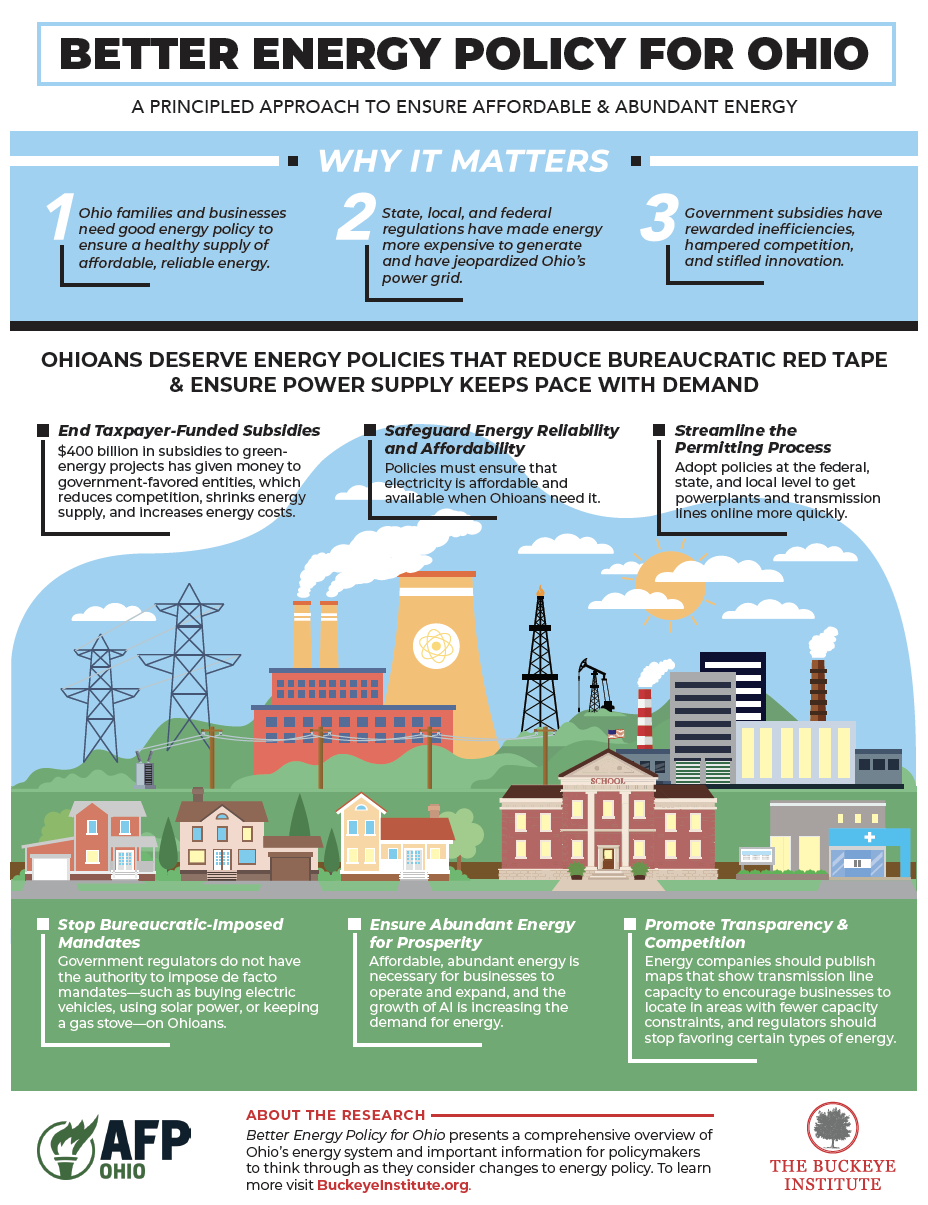The Buckeye Institute: Policies in HB15 Will Ensure Affordable, Reliable Energy
Apr 29, 2025Columbus, OH – On Tuesday, The Buckeye Institute submitted written testimony (see full text below or download a PDF) to the Ohio Senate Energy Committee on the policies in Ohio House Bill 15, which, if adopted, would help ensure a healthy supply of affordable, reliable energy to meet growing demand.
In his testimony, Greg R. Lawson, a research fellow at The Buckeye Institute, noted that the policies in the bill adhere to the “sound energy policies recommended [] by The Buckeye Institute and Americans for Prosperity.” The bill rightly:
- Ends government subsidies that damage energy markets;
- Incentivizes new energy production by lowering taxes on new generations;
- Streamlines the siting process for new generation and transmission;
- Eliminates electric security plans and;
- Ensure utilities remain focused on transmission and distribution—not generation.
To improve the bill, Lawson urged lawmakers to:
- Protect customers by requiring a third-party audit of a utility’s requests for a rate increase and require utilities to attest that all costs incurred are “reasonable and prudent;”
- Require the state to draw “heat maps” for natural gas pipeline—similar to electricity “heat maps”—to help manage their capacity; and
- Allow virtual net metering on brownfields to provide additional ways to expand energy production.
# # #
More Affordable, Reliable Energy for Ohio
Interested Party Testimony
Ohio Senate Energy Committee
Ohio House Bill 15
Greg R. Lawson, Research Fellow
The Buckeye Institute
April 29, 2025
As Submitted
Chair Chavez, Vice Chair Landis, Ranking Member Smith, and members of the Committee, thank you for the opportunity to submit written testimony regarding Ohio House Bill 15.
My name is Greg R. Lawson. I am the research fellow at The Buckeye Institute, an independent research and educational institution—a think tank—whose mission is to advance free-market public policy in the states.
House Bill 15 is Ohio’s most free-market piece of energy legislation since the deregulation efforts in the late 1990s. The bill adheres to sound energy policies recommended earlier this year by The Buckeye Institute and Americans for Prosperity. It rightly ends government subsidies that damage energy markets, incentivizes new energy production by lowering taxes on new generations, streamlines the siting process for new generation and transmission, eliminates electric security plans, and continues to ensure utilities remain focused on transmission and distribution—not generation. As The Buckeye Institute previously testified, House Bill 15 creates readily accessible maps of geographic “hotspots” that require more electricity generation and/or transmission.
Several amendments, however, could improve the bill even more.
First, the legislation’s language regarding the “true up” process during rate cases before the Public Utilities Commission is vague enough that utilities may get a rate of return on unneeded capacity. A third-party audit and language ensuring that all costs incurred are “reasonable and prudent” would help clarify the process and protect rate payers.
Second, in addition to electricity “hotspots,” Ohio should draw similar “heat maps” for natural gas pipelines to help manage their capacity. Natural gas remains a critical source for generating electricity and Ohio must avoid future supply interruptions as residential and industrial demand increases.
Finally, as The Buckeye Institute testified regarding Senate Bill 275 during the last General Assembly, a virtual net metering option on brownfields could help expand energy production for users beyond the major energy consumers. We suggest including the virtual net metering option alongside the community energy pilot included in House Bill 15. We also recommend allowing market participants to develop “microgrids” to facilitate large-scale demand by major consumers like data centers and high-end manufacturing firms.
House Bill 15 takes great strides toward meeting Ohio’s current and future energy challenges and does so in a market-friendly way.
Thank you for your time.
# # #

